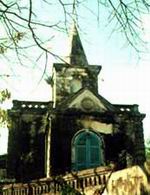Dien Hai Citade

Dien Hai Citadel is located in Thach Thang Ward, Hai Chau District, Danang. The Dien Hai Citadel was formerly known as Dien Hai Fortress, built in 1813 in the twelfth year of Gia Long’s reign by Danang’s estuary.
The Dien Hai citadel was formerly known as Dien hai Fortress, built in 1813 in the twelfth year of Gia Long’s reign by Danang’s estuary.
It was renamed in 1835, the fifteenth year of Minh Mang’s reign, after it was moved inland and rebuilt in brick on a high mount in 1823, the fourth year of Minh Mang’s reign.
In 1840, Deputy Minister of Labour Nguyen Cong Tru inspected the defences of Danang and commanded a more powerful system for Dien Hai and An Hai Citadels.
In 1847, the seventh year of Thieu Tri’s reign the perimeter of Dien Hai was expanded to 556 meters with a wall 5 meters high surrounded by a ditch 3 meters deep. The citadel was designed with two gates, the main one opening to the south and the other to the east. In side, there was Hanh Cung (the royal step-over place), Ky Dai (high flagpole platform), a storehouse for food and ammunition and 30 large canon emplacements. The citadel was built in brick in the square Vauban style of architecture.
Dien Hai citadel, bearing the stamp of tradition of the struggle of Danang people and the nation in the persistent war against the French colonialists to protect national independence and territory, made an important contribution to the defeat of the French invaders in Danang in 1858-1860. A majestic statue of General Nguyen Tri Phuong was built up for memory to a magnanimous period of the city’s history.
Dien Hai Citadel was classified as a national historical relic by the Ministry of Culture and Communication on 16th November 1998 and a stele was permitted to be erected on 25th August 1998.
It was renamed in 1835, the fifteenth year of Minh Mang’s reign, after it was moved inland and rebuilt in brick on a high mount in 1823, the fourth year of Minh Mang’s reign.
In 1840, Deputy Minister of Labour Nguyen Cong Tru inspected the defences of Danang and commanded a more powerful system for Dien Hai and An Hai Citadels.
In 1847, the seventh year of Thieu Tri’s reign the perimeter of Dien Hai was expanded to 556 meters with a wall 5 meters high surrounded by a ditch 3 meters deep. The citadel was designed with two gates, the main one opening to the south and the other to the east. In side, there was Hanh Cung (the royal step-over place), Ky Dai (high flagpole platform), a storehouse for food and ammunition and 30 large canon emplacements. The citadel was built in brick in the square Vauban style of architecture.
Dien Hai citadel, bearing the stamp of tradition of the struggle of Danang people and the nation in the persistent war against the French colonialists to protect national independence and territory, made an important contribution to the defeat of the French invaders in Danang in 1858-1860. A majestic statue of General Nguyen Tri Phuong was built up for memory to a magnanimous period of the city’s history.
Dien Hai Citadel was classified as a national historical relic by the Ministry of Culture and Communication on 16th November 1998 and a stele was permitted to be erected on 25th August 1998.
